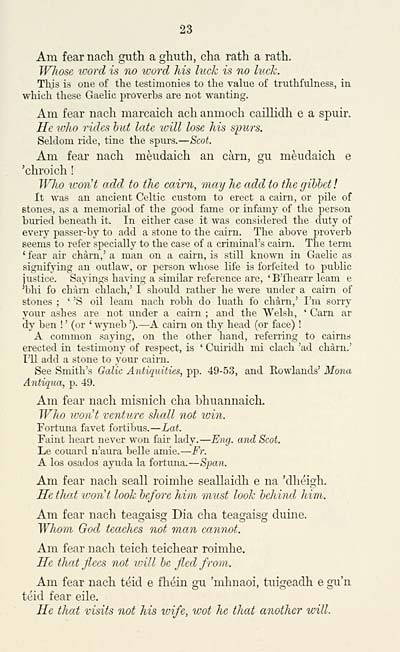Download files
Complete book:
Individual page:
Thumbnail gallery: Grid view | List view

23
Am fear nach guth a ghuth, cha rath a rath,
Wliose word is no word his hick is no lucJc.
This is one of the testimonies to the value of truthfulness, in
which these Gaelic proverbs are not wanting.
Am fear nacli marcaich ach anmoch caillidh e a spuir.
He who rides hit late ivill lose his spurs.
Seldom ride, tine the spurs. — Scot.
Am fear nach mèudaich an earn, gu mèudaich e
'chroich !
lllio icon't add to the cairn, may he add to the gibbet!
It was an ancient Celtic custom to erect a cairn, or pile of
stones, as a memorial of the good fame or infamy of the person
buried beneath it. In either case it was considered the duty of
every passer-by to add a stone to the cairn. The above proverb
seems to refer specially to the case of a criminal's cairn. The term
' fear air chàrn,' a man on a cairn, is still knowTi in Gaelic as
signifying an outlaw, or person whose life is forfeited to public
justice. Sayings having a similar reference are, ' B'fhearr leam e
'bhi fo chàrn chlach,' I should rather he were under a cairn of
stones ; ' 'S oil leam nach robh do luath fo chàrn,' I'm sorry
your ashes are not under a cairn ; and the Welsh, ' Cam ar
dy ben ! ' (or ' wyueb '). — A cairn on thy head (or face) !
A common saying, on the other hand, referring to cairns
erected in testimony of respect, is ' Cuii-idh mi clach 'ad chàrn.'
I'll add a stone to your cairn.
See Smith's Galic Antiquities, pp. 49-53, and Rowlands' Mona
Antiqua, p. 49.
Am fear nach misnich cha bhuannaich.
Who won't venture shall not win.
Fortuna favet fortibus.— iai.
Faint heart never won fair lady. — Eng. and Scot.
Le couard n'aura belle amie. — Fr.
A los osados ayuda la fortuna. — S^Mn.
Am fear nach seall roimhe seallaidh e na 'dheigh.
Me that won't look before him must look behind him.
Am fear nach teagaisg Dia cha teagaisg duine.
Whom God teaches not man cannot.
Am fear nach teich teichear roimhe.
He that fiees not vjill be fled from.
Am fear nach teid e fhein gu 'nihnaoi, tuigeadh e gu'n
teid fear eile.
He that visits not his wife, wot he that another will.
Am fear nach guth a ghuth, cha rath a rath,
Wliose word is no word his hick is no lucJc.
This is one of the testimonies to the value of truthfulness, in
which these Gaelic proverbs are not wanting.
Am fear nacli marcaich ach anmoch caillidh e a spuir.
He who rides hit late ivill lose his spurs.
Seldom ride, tine the spurs. — Scot.
Am fear nach mèudaich an earn, gu mèudaich e
'chroich !
lllio icon't add to the cairn, may he add to the gibbet!
It was an ancient Celtic custom to erect a cairn, or pile of
stones, as a memorial of the good fame or infamy of the person
buried beneath it. In either case it was considered the duty of
every passer-by to add a stone to the cairn. The above proverb
seems to refer specially to the case of a criminal's cairn. The term
' fear air chàrn,' a man on a cairn, is still knowTi in Gaelic as
signifying an outlaw, or person whose life is forfeited to public
justice. Sayings having a similar reference are, ' B'fhearr leam e
'bhi fo chàrn chlach,' I should rather he were under a cairn of
stones ; ' 'S oil leam nach robh do luath fo chàrn,' I'm sorry
your ashes are not under a cairn ; and the Welsh, ' Cam ar
dy ben ! ' (or ' wyueb '). — A cairn on thy head (or face) !
A common saying, on the other hand, referring to cairns
erected in testimony of respect, is ' Cuii-idh mi clach 'ad chàrn.'
I'll add a stone to your cairn.
See Smith's Galic Antiquities, pp. 49-53, and Rowlands' Mona
Antiqua, p. 49.
Am fear nach misnich cha bhuannaich.
Who won't venture shall not win.
Fortuna favet fortibus.— iai.
Faint heart never won fair lady. — Eng. and Scot.
Le couard n'aura belle amie. — Fr.
A los osados ayuda la fortuna. — S^Mn.
Am fear nach seall roimhe seallaidh e na 'dheigh.
Me that won't look before him must look behind him.
Am fear nach teagaisg Dia cha teagaisg duine.
Whom God teaches not man cannot.
Am fear nach teich teichear roimhe.
He that fiees not vjill be fled from.
Am fear nach teid e fhein gu 'nihnaoi, tuigeadh e gu'n
teid fear eile.
He that visits not his wife, wot he that another will.
Set display mode to: Large image | Transcription
Images and transcriptions on this page, including medium image downloads, may be used under the Creative Commons Attribution 4.0 International Licence unless otherwise stated. ![]()
| Early Gaelic Book Collections > Blair Collection > Collection of Gaelic proverbs and familiar phrases > (63) |
|---|
| Permanent URL | https://digital.nls.uk/76277983 |
|---|
| Description | A selection of books from a collection of more than 500 titles, mostly on religious and literary topics. Also includes some material dealing with other Celtic languages and societies. Collection created towards the end of the 19th century by Lady Evelyn Stewart Murray. |
|---|
| Description | Selected items from five 'Special and Named Printed Collections'. Includes books in Gaelic and other Celtic languages, works about the Gaels, their languages, literature, culture and history. |
|---|

